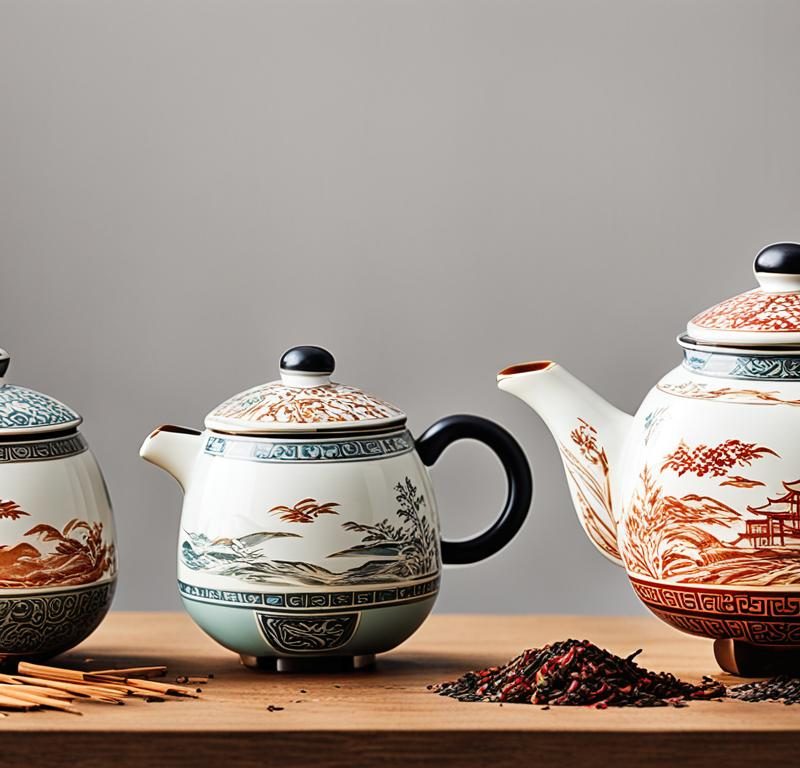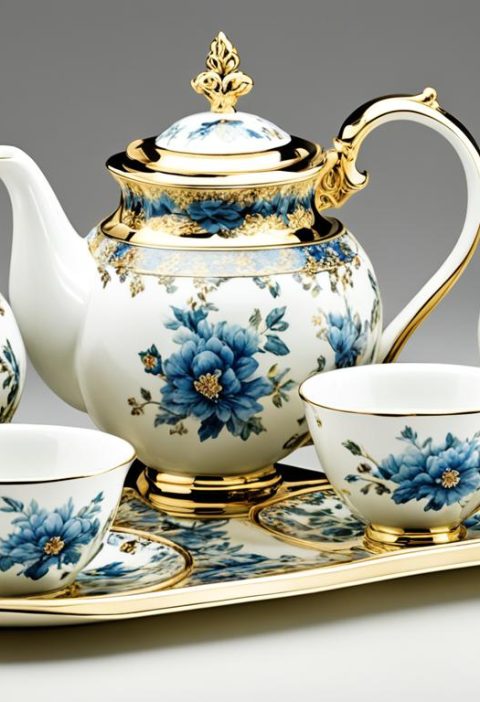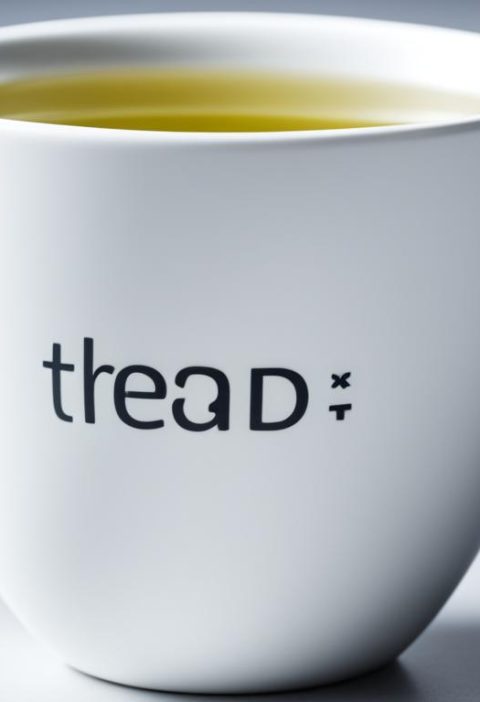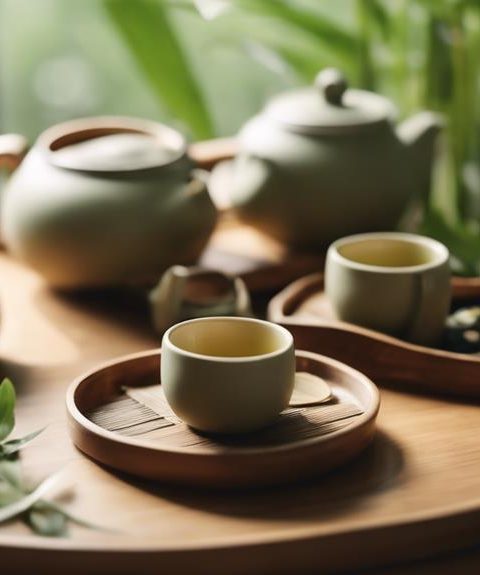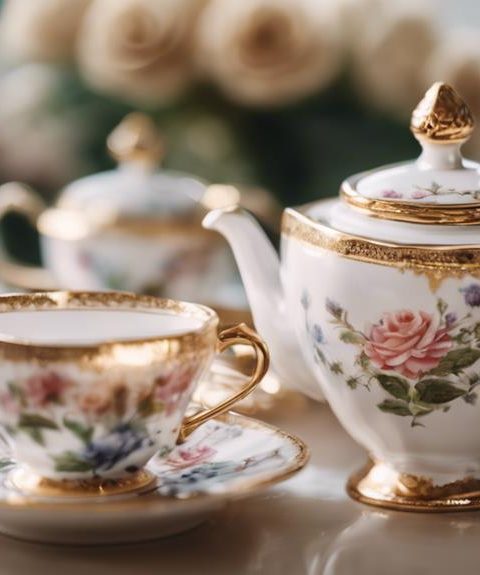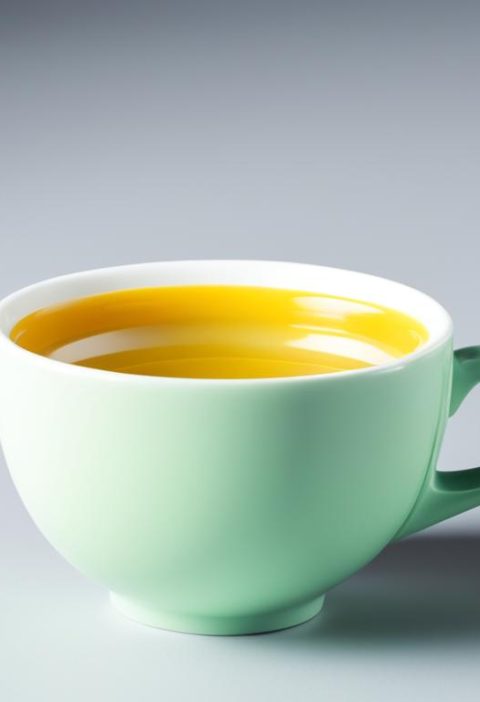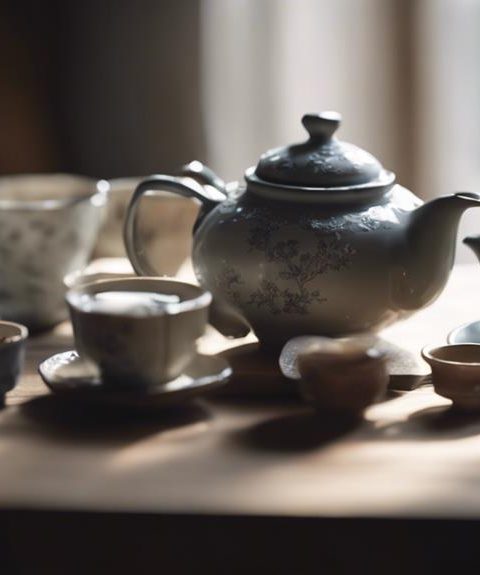Tea has a long history, shaping many parts of human life and culture for years. It has health benefits, such as helping the heart and brain, and keeping teeth healthy. Making tea the old-fashioned way can also relax us and reduce stress. Drinking tea brings people together and is important for making friends. In Taiwan, the tea culture is famous, offering a wide range of teas. But, with so many sweet tea drinks available, it’s hard to keep this tradition alive. To overcome this, making tea has to become more special. We need to change how tea tools look and work.
The Science Behind Teacups: Design Innovations for Optimal Brewing
Choosing the right teacup is key to a great tea experience. There are many teacup styles and functions. Designers focus on making teacups that are easy and comfortable to use. Now, teacups use new materials and methods to make brewing better.
Key Takeaways:
- Tea has numerous health benefits and is deeply rooted in human culture.
- Taiwan’s tea culture faces challenges from modern beverage options.
- Improving the tea brewing experience and innovating tea utensil design are crucial.
- Teacup design plays a significant role in the overall tea-drinking experience.
- The design of teacups should prioritize functionality and ergonomics.
The Features of Taiwan Tea Art
Taiwan’s tea culture stands out as a blend of Chinese and Japanese influences. It has developed into something unique and diverse. This mix has created a tea culture unlike any other, combining the best of both worlds.
What are the tea-brewing methods in Taiwan?
Taiwanese people take their tea seriously. They focus on the amount of tea used, how long it steeps, and the water’s temperature. These key points bring out the best flavors and scents. This unique approach ensures every cup is full of delight.
What makes Taiwanese tea utensils special?
Taiwanese teacups and teapots aren’t just for use, they’re also stunning. These items are made to be both beautiful and functional. Artisans have also created modern tea tools, like serving pitchers and sniffing cups. These tools make the tea experience even better.
How do Taiwanese tea utensils enhance the tea experience?
Taiwanese tea tools have changed how we brew and enjoy tea. For example, the serving pitcher helps mix and pour tea perfectly, keeping the taste right each time. Sniffing cups let people enjoy the tea’s aroma fully, adding a sensory layer to tea time.
What sets Taiwan’s tea culture apart from others?
Taiwan’s tea culture is all about change and new ideas. Local tea artisans are always looking for ways to make the tea experience better. This drive for innovation has made Taiwan a top spot for tea lovers who want freshness and excitement.
Is Taiwan’s tea art influenced by other cultures?
Definitely. Taiwan’s unique tea culture is a mix of Chinese and Japanese influences. These different traditions have all left their mark. The result is a lively tea culture that keeps getting better with time.
| Features of Taiwan Tea Art | Taiwanese Tea Utensils | Tea-Brewing Methods |
|---|---|---|
| Influenced by Chinese and Japanese tea cultures | Prioritize usability, aesthetics, and stability | Focus on quantity of tea leaves, steeping time, and water temperature |
| Flexible and continually updated | Innovative tea utensils like serving pitchers and sniffing cups | Ensure rich and satisfying tea flavors and aromas |
| Unique and diverse tea culture | Enhance tea-drinking experience and immersion | Revolutionize traditional tea-brewing methods |
The Methods for Brewing Oolong Tea in Taiwan
In Taiwan, preparing oolong tea is an art. There are specific steps to get a tasty, fragrant cup. The amount of time you steep the tea and the temperature of the water are key. Now, let’s look at these steps in detail.
How much tea leaves should you use?
For a great cup of oolong, use the right amount of leaves. Aim for one teaspoon for every six ounces of water. You can adjust this to make your tea stronger or weaker.
What is the optimal steeping time for oolong tea?
The steeping time varies with the type of oolong. Generally, oolong teas need 3-5 minutes to steep well. Yet, for darker oolongs, you might steep them for 5-7 minutes for best taste and smell.
How important is water temperature control?
The right water temperature is key in making oolong tea. The water should be between 190°F and 205°F. Using a thermometer or a kettle with temperature settings can help you hit the mark.
Brewing oolong may look hard, but once you know the steps, it’s fun. Don’t be afraid to try different times and temperatures for your perfect cup. Use these tips to enjoy the deep and delicate notes of oolong, sip by sip.
Features of Taiwanese Tea Utensils Set
Taiwan has a rich tea culture that’s reflected in its many tea utensils. These utensils make brewing and serving tea better. They mix unique designs with great functions, changing how we see the art of making tea. So, let’s take a closer look at these amazing tea tools.
1. Teacups: Aesthetic Marvels
Taiwanese teacups are diverse, coming in many shapes and sizes. They range from light porcelain to strong ceramics. Beyond holding tea, these cups decorate and make tea-time elegant.
2. Serving Pitchers: Ensuring Consistency
In Taiwan, blending and serving tea consistently is key. Enter fairness cups, an important part of the tea service. They help tea makers ensure each cup of tea is brewed perfectly. So, everyone gets the same delightful taste.
3. Sniffing Cups: Exploring Aromas
Sniffing cups are a hit in Taiwanese tea culture. These special cups help you smell the tea’s aroma better. This lets you enjoy the smell deeply before tasting the tea.
4. Tea Scoops: Measuring Precision
Tea scoops help measure tea leaves exactly. They’re usually made from bamboo or ceramics. This helps tea fans balance flavors and aromas in their tea perfectly.
5. Tea Sticks: Stirring Elegance
Tea sticks, also tea pickers, are thin and elegant. They’re not just for stirring tea. They’re great for picking out tea leaves too. Plus, they look nice in tea ceremonies. They add a dash of style.
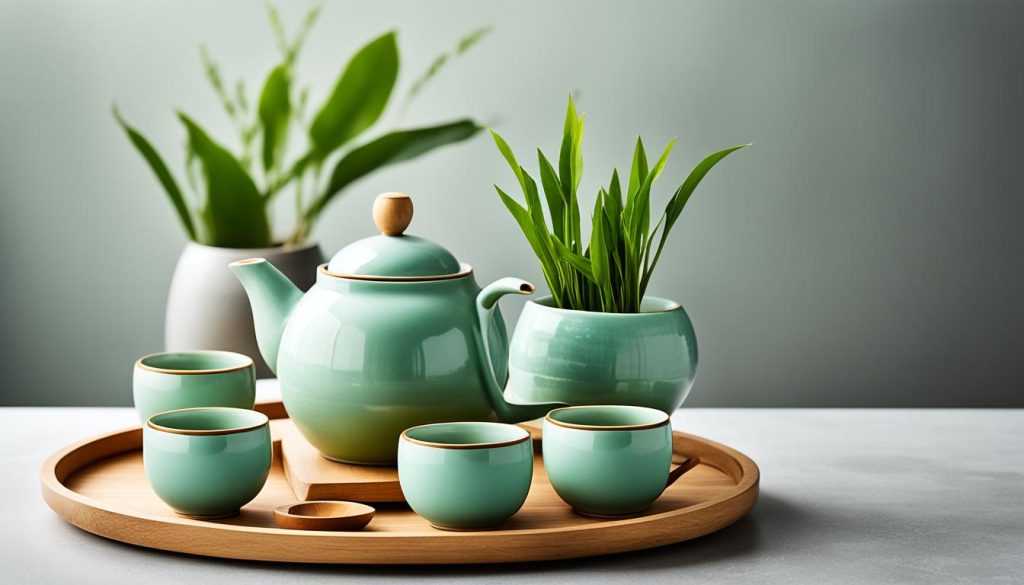
Taiwanese tea utensils show the creativity and heart of Taiwan’s tea scene. They mix new ideas with old, turning tea-making into an art. Whether you’re new to tea or a seasoned fan, these Taiwan tea tools will make your tea time special.
Research Framework and Methodology
This study aimed to create new tea tools by using many scientific methods. We first tried to see what tea lovers really need. Then, we made different tea tools and checked if they worked well.
How was the research framework developed?
We mixed several scientific methods to make a full, detailed plan for tea tool designs. Our main goal was to find ideas that are both smart and new.
What scientific methods were employed?
We used a few key scientific techniques. For example, we traced how customers find and use tea tools. We also looked at what makes a tea tool great by using special ranking methods and detailed analysis.
What is customer journey mapping?
Customer journey mapping shows the whole experience customers have with tea tools. It highlights where things could be better and what features people love. This helps in making better designs for tea-drinkers.
What is quality functional deployment?
Quality functional deployment makes sure tea tools meet what customers want. It picks the most important features and turns them into design goals. This way, the final tea tools are top quality.
How did sensory evaluation contribute to the research?
For tea utensil design, we checked how it affects tea’s taste, smell, and look. Tea lovers joined tests to see how different designs changed their tea experience. Their feedback gave us valuable details on how design impacts taste.
What was the goal of the research framework and methodology?
This research aimed to create innovative tea tools that make the tea experience better. By using scientific methods and focusing on taste and design, we wanted to make tools that tea fans would especially enjoy.
The Importance of Teacup Design for Optimal Brewing
Teacup design is key for making the best cup of tea. It affects how strong the tea tastes, its bitterness, and sweet aftertaste. The shape and color of the cup can change how we enjoy our tea.
When teacups are designed well, they make our tea time pleasant. This also helps in creating a tea-drinking experience that looks good.
How does teacup design affect tea taste?
The way a teacup is shaped affects how tea tastes to us. The rim’s thickness and shape can change how you perceive the flavors. Teacup material, particularly ceramic and porcelain, keeps the tea’s flavor true.
Can teacup design affect the aroma of tea?
Definitely! Teacup shape impacts the smell of the tea. It affects how strong the tea’s scent is. The mug’s rim can even change how we smell the tea, making the experience better.
How does teacup design impact the tea-drinking experience?
The design of teacups makes tea time better overall. An easy-to-hold handle, for instance, increases comfort. Teacups that are balanced and not too heavy add to the fun of drinking tea.
Teacups that look beautiful add to the joy of drinking tea. They make the whole event feel special.
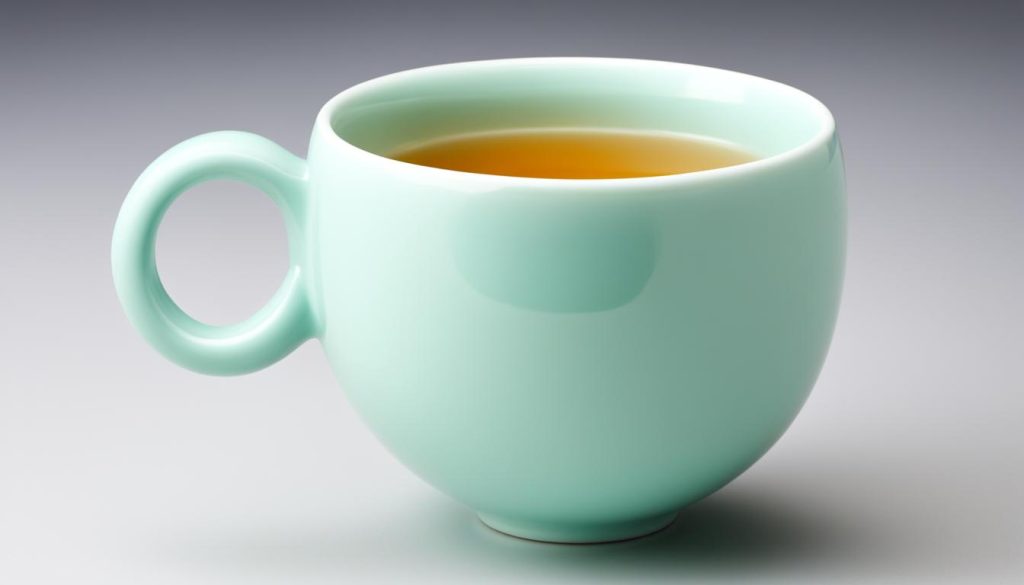
Are there specific teacup designs for different types of tea?
Yes. Different teacups are used for different teas. For instance, green tea teacups are small, letting the tea cool fast. Oolong tea cups are big so the tea can be smelled more.
These designs help bring out the best in every kind of tea.
What are some popular teacup designs?
There are many teacup styles that people love. Some have bright colors and traditional patterns. Others are simple and modern. “Insulated teacups” are also a hit, keeping the tea warm longer.
Manufacturing Process and Design Innovations
Tea set production focuses on both beauty and sustainability. Manufacturers often use ceramic materials for their looks and eco-friendliness.
Innovative teacup designs blend old and new. They aim for tea sets that look great, work well, and are easy to use.
The design journey starts with brainstorming and mock-ups. 3D printing brings ideas into reality, helping fine-tune designs.
Sustainability is key in tea set making. This focus reduces waste and energy use, meeting a worldwide demand for green products.
FAQs
1. What materials are commonly used in tea set manufacturing?
Ceramic materials are the go-to in tea set making. They are loved for their looks and for being kind to the environment. Ceramic tea sets are tough and keep your tea warm.
2. How do innovative teacup designs incorporate both historical and modern elements?
New teacup designs mix old and new. They might use special shapes, designs, or materials. This mix makes teacups look amazing and work well.
3. What is the role of 3D printing in tea set manufacturing?
3D printing is big in making tea sets. It lets makers quickly test new design ideas. This way, they can make sure their teacups look good and work properly before making lots of them.
4. How do sustainable design practices benefit tea set manufacturing?
Green design helps cut down on waste and energy use. It lets makers help the environment and meet the need for eco-friendly products.
5. How does the focus on practical beauty impact tea set design?
Designs that are both beautiful and practical make great tea sets. They are a joy to look at and use. This makes the tea drinking experience even better.
Conclusion
Teacup design is vital for your tea time. It makes the experience better and helps brew your tea just right. Innovative teas tools from Taiwan have been made. They make your tea drinking special by focusing on oolong tea’s simplicity and quality. This ensures you get the perfect mix of flavors every time.
Scientists have looked into how teacups affect the taste of tea. They found that the design of the teacup changes your tea. This helps tea lovers have a deeper and more enjoyable experience.
The making of tea sets happens with the environment in mind. They use sustainable materials and methods. This reduces waste and saves energy. As people’s wants change, teacup design also needs to change. It must keep up with these changes while staying green in making tea tools
